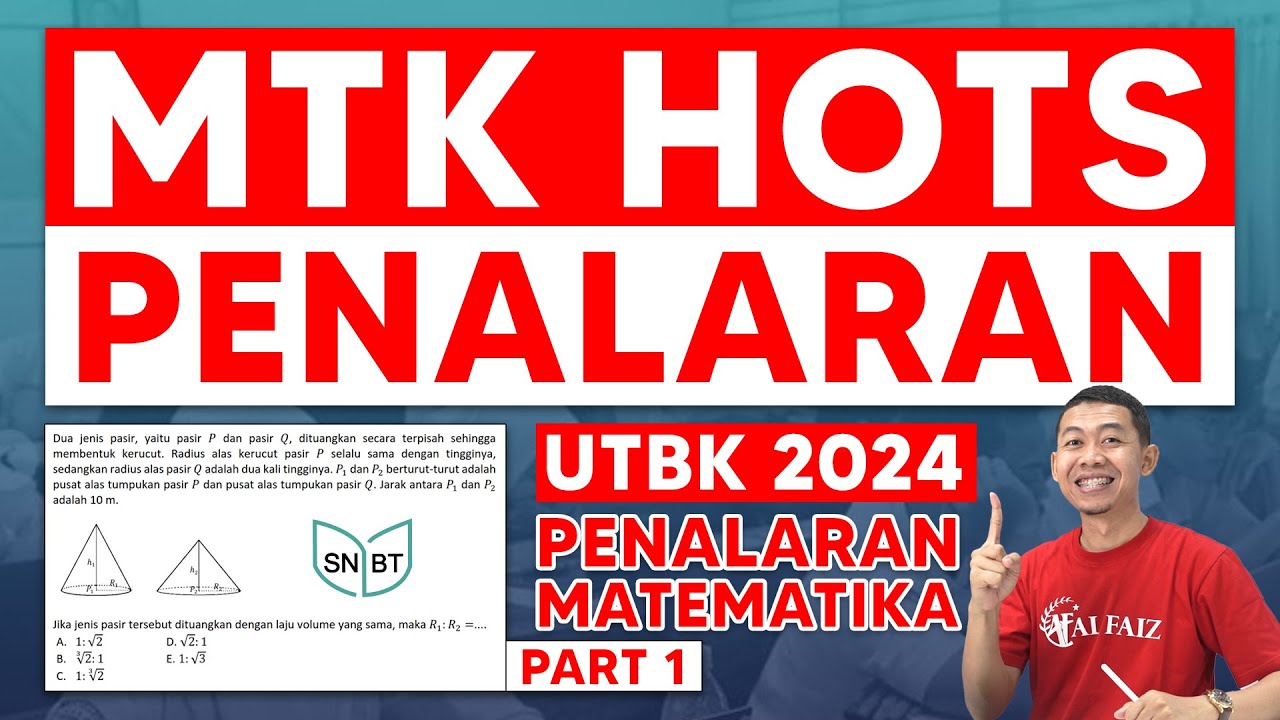KUPAS TUNTAS SISTEM PENILAIAN UTBK SNBT 2025 dan STRATEGI SKOR UTBK TINGGI DENGAN PEMBOBOTAN
Summary
TLDRIn this video, the speaker discusses strategies for excelling in the UTBK (University Entrance Test) based on the 2024 grading system. The UTBK uses the Item Response Theory (IRT), where harder questions offer higher points. Key tips include answering all questions, focusing on difficult ones, understanding the underlying concepts, and avoiding stress. The speaker emphasizes preparing by practicing with past questions and using timed simulations to improve time management. The video concludes with encouragement to stay calm and focused for the best chance of success in reaching one's dream university.
Takeaways
- 😀 The UTBK system does not penalize for incorrect or unanswered questions, encouraging participants to attempt all questions.
- 😀 The weighting of questions is based on how many participants answer them correctly: more correct answers mean lower points, and fewer correct answers mean higher points.
- 😀 The UTBK evaluation uses the IRT (Item Response Theory) system to assign different point values depending on the difficulty of each question.
- 😀 A key strategy for achieving a high UTBK score is to answer all questions, particularly the more difficult ones, as they yield higher points.
- 😀 Understanding the concept behind the questions is crucial; memorizing solutions to practice questions may not help if the questions are framed differently.
- 😀 Participants should not be nervous during the UTBK. Remaining calm and focused is essential for maximizing concentration and performance.
- 😀 To prepare effectively, it is important to study the core concepts rather than simply memorizing question formats from previous years or sample questions.
- 😀 Practice with timed mock tests (tryouts) is essential to get used to the pressure of answering questions within a time limit, simulating the real exam environment.
- 😀 The IRT system means that the UTBK scores are only finalized after all participants have completed the exam, ensuring fairness and accuracy in the scoring process.
- 😀 It’s important to stay focused on your own UTBK preparation and not get distracted by rumors or speculation regarding scoring or question leaks.
- 😀 To enhance exam readiness, students should actively engage with study materials, including question simulations from official sources, to build confidence and skills.
Q & A
What is the key feature of the UTBK scoring system as explained in the video?
-The UTBK scoring system does not deduct points for incorrect or unanswered questions. It is designed so that participants are encouraged to answer all questions.
What does IRT (Item Response Theory) involve in the context of UTBK scoring?
-IRT is used to assign different weights to questions based on their difficulty. Questions that are answered correctly by fewer participants have a higher weight, rewarding those who answer difficult questions correctly.
How are question difficulties classified in the UTBK system?
-The difficulty of a question is determined by the proportion of participants who answer it correctly. If fewer than 30% answer a question correctly, it is classified as difficult, and those who answer it correctly earn more points.
What strategy should participants use to maximize their UTBK score?
-Participants should aim to answer all questions, particularly the difficult ones, as these carry more weight in the scoring system.
What role does familiarity with previous question types play in preparing for UTBK?
-Familiarity with question types helps participants understand the format and approach to answering, even if the exact questions are different each year. Reviewing past questions helps in preparation for the types of questions likely to appear.
How can participants reduce nervousness during the UTBK exam?
-Participants should calm their nerves by focusing on their preparation and treating the test as an opportunity to demonstrate their skills, rather than something to fear.
Why is it important to practice with timed mock tests for UTBK?
-Timed mock tests help simulate the actual exam environment, enabling participants to practice time management and reduce the risk of running out of time during the real test.
What is the significance of following post-exam discussions or FR (frequently released) questions after the first session?
-Following FR questions allows participants to familiarize themselves with the question types and the difficulty level, helping them strategize for the second session, even though the actual questions will differ in specific content.
How should participants handle the uncertainty of different question formats in UTBK?
-Participants should focus on understanding the underlying concepts rather than memorizing specific question formats. This will help them tackle variations of the same question type that may appear on the exam.
What is a common misconception about how the UTBK scoring system works?
-A common misconception is that participants who finish early will have a higher score. In reality, all participants' answers are evaluated after everyone has completed the exam, using the IRT system to assess difficulty and weight.
Outlines

This section is available to paid users only. Please upgrade to access this part.
Upgrade NowMindmap

This section is available to paid users only. Please upgrade to access this part.
Upgrade NowKeywords

This section is available to paid users only. Please upgrade to access this part.
Upgrade NowHighlights

This section is available to paid users only. Please upgrade to access this part.
Upgrade NowTranscripts

This section is available to paid users only. Please upgrade to access this part.
Upgrade NowBrowse More Related Video
5.0 / 5 (0 votes)





